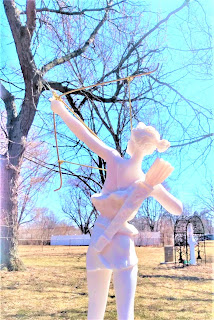In Delphi I shall build my rich temple to be an oracle for man, and her words shall never fail.
- Apollon.
Her words were just that, amazingly accurate and wise, and she made Delphi the religious and cultural center of the ancient world. Even today, people still come from all over the globe to see the ruins of the sanctuary, where they continue to discuss ideas, beliefs, history and current affairs from their homelands. Delphi always serves its general purpose no matter how long the site has remained abandoned. It's no wonder that it's considered a world heritage location. But I also think the role of the Pythia, and indeed that of the Greek oracle in general, has been misunderstood by modern man, and sometimes even by ancient man.
Ancient Greek religious historians know well the story of King Croesus of Lydia in Asia Minor and his consultation with the Pythia. Planning an invasion in the East, he asked if he would defeat the Persian Empire. The Pythia responded by saying that if he invaded, he would destroy a great empire. He didn't realize, however, that it would be his own. But the bigger picture is that ancient Greek historians and probably the priests of Delphi thought his question to be very odd, in that she was not there to predict the future.
She was a counselor to mankind, blessed by Apollon to give the best advice possible. She was suited to tell people the best courses of action, or which God to appease, in a given circumstance. For example, one of my favorite oracular responses in Delphic history has to do with the Persian Wars in 480 BCE. When the Persians began the invasion of northern Greece, the Pythia told the Delphians to pray to the Winds, because they would be Greece's strongest allies. Soon after, a very violent storm gathered in the north and sunk or beached at least 20% of the Persian fleet, while the Greek ships remained untouched. This is factually recorded. The Pythia did not predict the future here, she told the Greeks where their greatest allies were.
As the oracle of my temple, my wife is pretty much the same way. Even when I myself have asked her questions, she has always responded with advice, not predictions, and yet that advice can still secure a great outcome because it comes from a God. Apollon does not attempt to dictate or live our lives for us. He wants us to think, grow and become the best we can be.
In the Goodness of the Gods,
Chris Aldridge.
Sources
Scott, Michael, Delphi A History of the Center of the Ancient World, Princeton, New Jersey, Princeton University Press, 2014.
Stagman, Myron, 100 Prophecies of the Delphic Oracle, Prophetic Advice from the God Apollo, City-State Press, 1999.



.jpg)

